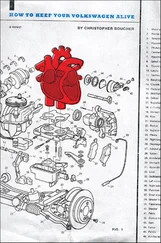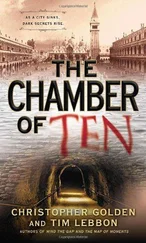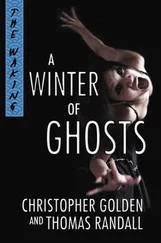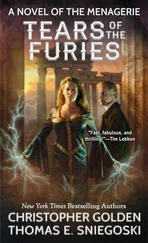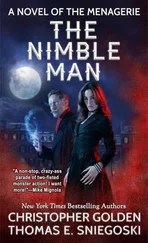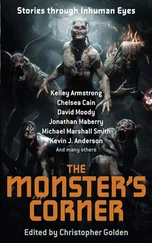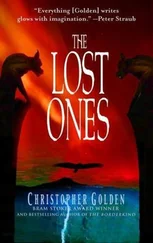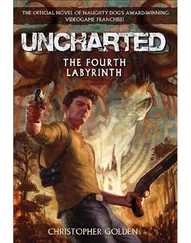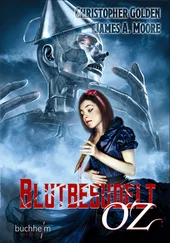— and we’ll stuff as many stories as we can in there.
Reader: They smell like cigarettes.
Those are my Mom’s. Don’t smoke them! They’re special MotherSmokes, six feet long and strong as Baz. Once I tried one and my mind started coughing and hacking and it almost puked into my skull.
Reader: That all of them?
Just — one more. There. Now we’ll just close up your skull good and tight, and you’re good to go. Hey — what page are we on?
Reader: 17.
OK — let’s go. We’re late already.
Reader: Go where?
Forward. To try to fix this. We’ve got to try to save Appleseed.
Turn the page, step onto the margin, and you’re at the edge of Appleseed, Massachusetts, standing right on the Connecticut-Massachusetts border, next to the Connecticut River. See? You can see Appleseed City — the smokestacks of Bondy’s Island, the Meaning District — off behind you. To your right is the town: the Amphitheatre, the Town Hall, the Appleseed Free Library, the Shoppes. Back behind them, but before you reach Appleseed Mountain, are the Prison and the Mental Hospital.
I wasn’t born here in Appleseed. We lived off the northwest margin until I was three, and moseyed here the way most of my friends’ families did, as part of the Housing Boom of ’77. That year, droves of houses — two-stories, ranches, Victorian mansions, cottages — stumbled across New England, looking for a space to settle. The boom began as a murmur in Vermont and bombasted into New Hampshire and Massachusetts. Houses started crossing the Connecticut River in March of ’77, marching through Greenfield, Easthampton, and Agawam. Our house walked that entire summer, carrying my family inside it every step. My parents spent all day steering from the porch while my sister Briana, who was four at the time, sat in front of the TV and I slept in my steel case.
By the time the houses reached Massachusetts, my Dad said, every major road was blocked. “The old highways were literally clogged with houses,” he told me once, on a drive out to visit The Ear. The Ear was a handyman, like my Dad, except he always had much better tools. “What’s sad is?” my Dad said. “Some of those houses—”
“Died right there on the road,” said a thought lying on the couch in my mind. I’d heard this story a hundred times before.
“Died!” my Dad said. “Right on the road! Their foundations cracked from all that idling!”
“Those are the suburbs now,” said the thought, shoving some crackers into its mouth.
“And they closed down the roads and made those the new suburbs!” my Dad said.
By the time my parents made it into the Pioneer Valley, most of the towns along Old Route Five had closed their exits. You’d see signs, my Dad said, reading NO PLOTS AVAILABLE.
“It was nervewracking,” said my Dad, driving us through the Meadows. “You know how your Mom gets. And the TV antenna broke somewhere around West Springfield, so your sister was so bored.”
“What about me?”
“You were,” he said, “you. Quiet. Thinking in the Vox.”
At three, I had not yet made a single sound — not a gurgle, not a bleep, not a screech. I used to just sit still and stare like a reader, my Mom said, with a terrified look on my face. Sometimes tears would run down my cheeks, my Dad said, but no sound would accompany them. My parents thought that I might never speak, that I was mute, that I might not have been born with a voice. My thoughts kept repeating the same words, over and over: “You won’t,” they’d say.
Reader: Won’t what ?
Won’t anything — won’t talk; won’t be . My parents took me to see a doctorcoat who specialized in early speech, and he sent us home with something called “the Vox”—an iron-lung-type case which was designed to help with vocal development.
I remember that box — the hours, days, years lying awake inside it. Speakers inside the box filled it with sounds: squawks, yipes, zoops, words, and sentences. “The capital of North Dakota is Bismarck,” the speakers would say. “B-I-S-M-A-R-C-K.”
“I’m not,” I thought to the Vox.
“Water freezes at thirty-two words per second.
“You live in America . A-M-E-R-I–C-A.
“You have one nose and two ears. Ears rhymes with years. Years rhymes with fears.”
Slowly, I learned more words. “I’m lonely,” I thought to the Vox.
“Everyone is lonely,” the Vox replied. “At least you have the Reader.”
Which was a good point.
“I want to get out of here,” I prayed.
“No, you don’t,” said the Vox. “You wouldn’t survive a year in Appleseed.”
“Why not?” I prayed. “What’s wrong with me?”
The Vox looked me over. “Where to even begin ,” it said.
That box became my first cage. Remember looking through the foggy glass and seeing the sunlight shouting through the window?
Reader: Who — me? I just got here. I just now arrived in Appleseed.
How I’d send my thoughts to run around the neighborhood so they could tell me what it looked like? How, sometimes, my sister would peer down through the glass at me, her curly blond hair obstructing almost all of the light?
“Help!” my thoughts would say to her.
“  ?” she’d say. “Can you hear me?”
?” she’d say. “Can you hear me?”
“Get me out of here!” I’d think.
I remember my Mom’s visits, too: how she’d open up the Vox to feed me food or vitamins. If there were tears on my face, she’d wipe them away. If I still didn’t stop crying, she’d lift me out of the Vox and cradle me. “This is only temporary,” she’d say. “OK?”
“OK,” my thought would say.
Then she’d put me back into the Vox, lock it, and leave.
“We were getting desperate,” my Dad said, as we neared The Ear’s neighborhood. With the house inching along Five, my parents started to panic: how far would they have to go before finding a plot? “We were starting to think that we might have to live in Connecticut !” my Dad said.
Then, just a few miles from the Connecticut border, my house spoke up. “What about that one?” it said, and pointed to a banged-up sign. I knew that sign — it sang, APPLESEED, EST. 1775, and below it, ALL NEW WORDS MUST REGISTER AT THE TOWN HALL.
My parents had never even heard of Appleseed. Was it a real town? When they checked the map, though, they found the word “Appleseed”—a tiny round quell in the corner of the state.
Just at that moment, my Dad said, he and my Mom heard a sound from the other room — a “chirp,” my Mom called it. They ignored it at first, but then they heard it again. My Mom once told me that it sounded like a baby bird.
They followed the sound through the house—“Chirp! Chirp!”—and into the TV room, where Briana sat next to the Vox. “What’s making that sound?” my Mom asked Briana.
“That’s  ,” said Bri, matter-of-factly.
,” said Bri, matter-of-factly.
My parents looked at the Vox. They heard the chirp again.
“See?” said Briana.
My Dad opened the steel case. I have a foggy memory of this moment — of everyone standing over me, and of opening my mouth wide to make the biggest sound I could.
“Appa,” I said.
My parents looked at each other.
“See?” said Briana.
“Appa,” I said again.
“He’s saying apple ,” my sister announced.
My Mom once told me that tears appeared on my father’s face when I made my first sounds. My Dad, meanwhile, said my Mom ran back out to the porch and steered the house off the winding ramp and into Appleseed. “Your Mom thought it was a signal or something,” my Dad said.
Читать дальше
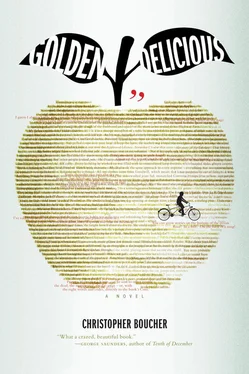
 ?” she’d say. “Can you hear me?”
?” she’d say. “Can you hear me?”
